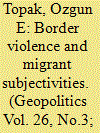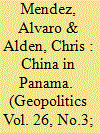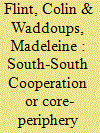|
|
|
Sort Order |
|
|
|
Items / Page
|
|
|
|
|
|
|
| Srl | Item |
| 1 |
ID:
178062


|
|
|
|
|
| Summary/Abstract |
This article draws on ethnographic fieldwork material from Greece to investigate the types of subjectivities migrants develop when they are confronted by the material border violence. It utilizes an aleatory materialist theory of subjectivity and mobilizes four analytical categories to illustrate the diversity of migrant subjectivities: abject, religious, nomadic, and dissident. The article further demonstrates that migrants might move from one category to another or belong to multiple categories at the same time. This article contributes to the critical literature that challenges the mainstream reductive representation of migrant subjectivity (either as victims or criminals) by developing an aleatory materialist framework and emphasizing the intersections and shifts among migrant subjectivity categories.
|
|
|
|
|
|
|
|
|
|
|
|
|
|
|
|
| 2 |
ID:
178064


|
|
|
|
|
| Summary/Abstract |
The globalisation of China’s development strategy, from its origins as infrastructure diplomacy connecting its domestic west with its Central Asian periphery, into the transnational Belt and Road Initiative encompassing the periphery of the world system, epitomises the rapid evolution of a Chinese grand strategy of great economic and political ambition. The small state of Panama is a key node in the global trading system that can make an unexpectedly large contribution to China’s national security and international influence. Accordingly, China’s economic statecraft in Panama is not only opening up the Latin America and Caribbean markets to further Chinese commercial penetration, but is simultaneously expanding its political influence in this remotest part of the global South. China’s is a two-track grand strategy positing to other nations a choice between a liberal internationalist co-prosperity and a zero-sum realist contest. This audacious approach relies on relational power amongst small states, especially semi-peripheral ones like Panama, to put China at the forefront of what is shaping up as a grand coalition of the global South collectively challenging American hegemony.
|
|
|
|
|
|
|
|
|
|
|
|
|
|
|
|
| 3 |
ID:
178065


|
|
|
|
|
| Summary/Abstract |
With China rapidly expanding its aid programme in the Pacific Islands region, there is a growing concern among established powers about China’s sway over the aid-dependent Pacific Island states. Systematic studies of China’s development finance to the small island countries are, however, rare and generally limited to mapping Chinese finance flows in the Pacific. This study seeks to contribute to the literature on China’s development efforts in the Pacific Islands region. Drawing on project-level data from AidData for the period 2000–2014, this paper disaggregates China’s official financing into its constituent parts and systematically explores the determinants of China’s Official Development Assistance (ODA) and its commercially-oriented finance flows to the Pacific. The panel data analysis finds that, contrary to popular belief, China does not reward voting compliance in the United Nations nor is its allocation of financing to the Pacific influenced by the countries’ level of indebtedness.
|
|
|
|
|
|
|
|
|
|
|
|
|
|
|
|
| 4 |
ID:
178057


|
|
|
|
|
| Summary/Abstract |
The cultural, legal, budgetary, infrastructural, and logistical processes through which the contemporary space race unfolds have measurable environmental footprints on Earth and in outer space. The question of where these footprints fall is arbitrated by larger questions of geopolitical power and vulnerability, which means that human engagement with outer space is also a question of environmental justice. On Earth, environmental (in)justice unfolds on multiple scales: local and stratospheric emissions from space launches, the placement of outer space related infrastructure in so-called peripheral places, and the role of power in determining whether the use of such infrastructure aids socio-environmentally constructive or destructive practices. Beyond Earth, the environmental geopolitics are likewise multiscalar, manifesting in contemporary pollution issues such as orbital debris and conservation debates such as planetary protection protocols. The environmental geopolitics of Earth and outer space are inextricably linked by the spatial politics of privilege and the imposition of sacrifice – among people, places, and institutions. This paper explores the concept of outer space environments through classical, critical, environmental, and feminist geopolitical theories.
|
|
|
|
|
|
|
|
|
|
|
|
|
|
|
|
| 5 |
ID:
178068


|
|
|
|
|
| Summary/Abstract |
This paper poses three related questions. What is white ethno-nationalism as it exists today within the United States, how is this sentiment expressed by particular organizations, and how is it expressed by ordinary people who belong to these organizations? We begin what ethno-nationalism signifies and its relation to other forms of nationalism. We then check how certain indicators are present among supporters of an organization, Blue Lives Matter, which emerged as a reaction to Black Lives Matter. While this movement has framed itself as supportive of police rights, its negative reaction to Black Lives Matter has become a vehicle to express white ethno-nationalism. These views are gauged as a means to understanding the contours of banal white ethnonationalism as opposed to those more strident forms registered by neo-Nazis and KKK members.
|
|
|
|
|
|
|
|
|
|
|
|
|
|
|
|
| 6 |
ID:
178060


|
|
|
|
|
| Summary/Abstract |
This paper engages with the (geo)political imaginaries of the Space Shuttle mission patches, through a consideration of the iconography they contain. Each Space Shuttle mission had a unique patch designed to represent the mission, which were typically worn on the arm of astronauts’ space suits. Drawing on visual methodologies and popular geopolitics, this paper critically engages with the patches’ iconography, their descriptions in official documentation, and the histories that frame their production. In doing so, this paper advances three interrelated arguments. First, that the mission patches of the Space Shuttle programme presented a uniquely American framing of outer space in their iconography and can thus be read as geopolitical texts. Second, that the iconography within the patches reflected the contemporary geopolitics of their time of production, but continued to subtly demonstrate American dominance in outer space. Finally, that the consumption of the patches in museums and through popular culture assist in the construction of American Manifest Destiny in outer space. This paper presents tangible examples of humanity’s engagement with outer space through the production of material cultures, while also pushing forward the agenda for further critical geographical engagement with outer space.
|
|
|
|
|
|
|
|
|
|
|
|
|
|
|
|
| 7 |
ID:
178063


|
|
|
|
|
| Summary/Abstract |
Travel blogs are an under-utilized data repository of everyday geopolitical musings. These public, longform, generally reflexive texts allow researchers to better understand how travellers narrate their own positionality and agency within limiting state structures. Geopolitics scholars of varying theoretical and topical interests can use travel blogs as data to better understand how everyday tourists and travellers ‘live geopolitics.’ Drawing primarily from popular and feminist geopolitical insights, this paper shows how travel blogs help us to rethink questions about geopolitical authorship, especially within a digital landscape of media fragmentation. This paper also provides a case study on the geopolitical discourse of ‘border talk’ in the blogs of international volunteer teachers in Namibia.
|
|
|
|
|
|
|
|
|
|
|
|
|
|
|
|
| 8 |
ID:
178061


|
|
|
|
|
| Summary/Abstract |
This paper addresses geopolitical cultures of outer space by examining the selected life and works of Arthur C. Clarke (1918–2008), one of the leading space technology advocates of the twentieth century, in the specific context of his adopted home of Ceylon/Sri Lanka. Within the framework of studies that have connected critical geopolitics and science, further discussions concerning the interface between imperialism, technology and tropicality help demonstrate the relevance of Clarke’s geographical imagination to understanding geopolitical cultures of outer space. Three aspects of Clarke’s life and works are examined: First, his underwater exploration activities in Ceylon from the late 1950s to the early 1970s; second, his 1979 Hugo and Nebula Award-winning novel The Fountains of Paradise; and finally, his promotion of Sri Lanka as a future hub of outer space technologies in the early 1980s. The paper suggests that geopolitical readings of outer space can be understood through investigating diverse aspects of place, landscape and identity.
|
|
|
|
|
|
|
|
|
|
|
|
|
|
|
|
| 9 |
ID:
178067


|
|
|
|
|
| Summary/Abstract |
Recent scholarship on the lived experiences of borderlands has foregrounded and theorized the pervasiveness of anxiety, violence, and lawlessness. While useful, these do not capture all of the ways in which borderland residents relate to diverse constellations of power. This paper examines the China (Tibet Autonomous Region) – Nepal borderland through the case of the Limi Valley, in the northwest corner of Nepal’s Humla district. Before 1959, the valley was considered part of Nepalese territory, yet its residents belonged administratively to the Tibetan government, an arrangement at odds with contemporary understandings of state territorial sovereignty. The non-postcolonial state formations of Nepal and China have created their own specific forms of border citizenship and overlapping sovereignties. The article shows how multiple sovereignties can stretch beyond state borders in unexpected ways by tracing how Limi Valley residents negotiate overlapping sovereignties of the Nepali and Chinese states, as well as the non-state sovereignty of the Tibetan government-in-exile. Furthermore, it demonstrates that these in turn overlap with a form of social sovereignty grounded in the community’s body of laws, codes, and practices, which are at once a historically sedimented trace of Limi’s governance before the nation-state, and a product of navigating political transformations. However, challenges to this social sovereignty, expressed through the idiom of statist law, have recently emerged. Whereas states typically exert sovereign power in borderlands by restricting mobility, some Limi villagers now selectively invoke state sovereignty through law to enable greater mobility.
|
|
|
|
|
|
|
|
|
|
|
|
|
|
|
|
| 10 |
ID:
178059


|
|
|
|
|
| Summary/Abstract |
If we look at a rendering of planet Earth from a bird’s eye view, we see a very familiar sight - satellites orbiting the planet like electrons, each one a testament to humanity’s expansion beyond Earth’s atmosphere. This familiar sight, nevertheless, begs the question: what is this new landscape? This paper looks at the production of outer space through a historical case study of Topex/Poseidon and its successors, internationally collaborative satellites designed primarily to measure the global circulation and topography of the Earth’s oceans. Tracing the history of these satellites, we open up a black box of entangled interests and enacted power that illuminates some of the ways in which Earthspace and outer space are co-produced. It leads us to encounter a global collaboration to collect oceanographic data (WOCE), the establishment of a new scientific discipline, Earth System Science, the fabrication of data infrastructure, as well as algorithms and exclusive computers, all which shed light upon the construction of outer space and the geopolitics of outer space that lie therein.
|
|
|
|
|
|
|
|
|
|
|
|
|
|
|
|
| 11 |
ID:
178066


|
|
|
|
|
| Summary/Abstract |
The geopolitics of development are explored through an examination of development assistance to two African countries as a mechanism of competition between China and the US. The processes of competition include the actions and rhetoric of African leaders. We define a geopolitical context for the agency of political leaders and opinion-makers in Ghana and Zambia. The geopolitical context consists of the structure and dynamics of the world-economy; especially the competition to capture the newest round of innovations and the related need to establish supply chains of raw materials from peripheral countries. By analysing quotes from Ghanaian and Zambian elites we identify the possibility for geopolitical agency in the periphery that is constrained by, and largely maintains, China-US competition and the core-periphery hierarchy of the world-economy.
|
|
|
|
|
|
|
|
|
|
|
|
|
|
|
|
| 12 |
ID:
178058


|
|
|
|
|
| Summary/Abstract |
Spaceport America, a spectacle to see with curvilinear geometry that itself looks like a spacecraft rising out of the desert near Truth or Consequences, New Mexico, conveys a hope of the everyman astronaut. Yet this private-public project, spending over $200 million in state taxpayer money to build and with a $2.85 million operating budget for 2017, does not provide the vertical transport analog of an airport. As Virgin Galactic stalls in launching its astronomically-priced zero-gravity music festival and commercial passenger flights, the facilities have been dusted off for educational rocketry club launches and Hollywood film backdrops while most public access to the grounds is restricted to expensive guided tours. As with the Spaceport, access to outer space itself raises questions of public versus private ownership and exclusivity. With the shifting role of nation states in offplanet activity, there are openings for outer space to become another site of capital accumulation or to manifest as envisioned by social movements and “community space programs.” This paper traces the ongoing realignment of public and private interests in offworld activity, of which Spaceport America is representative, considering how notions of offworld access have evolved since the aspirational vision of space as a commons laid out in the 1967 UN Outer Space Treaty. The paper juxtaposes the emerging public-private hegemony with the actions of three autonomous space organizations that actively construct alternative political economic models, technological systems, and cultural imaginaries of offworld access.
|
|
|
|
|
|
|
|
|
|
|
|
|
|
|
|
|
|
|
|
|